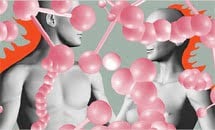by psychiatrist Richard A Friedman
 As everyone knows, sex feels good.
As everyone knows, sex feels good.
Or does it? In recent years, I’ve come across several patients for whom sex is not just unpleasurable; it actually seems to cause harm.
One patient, a young man in his mid-20s, described it this way: “After sex, I feel literally achy and depressed for about a day.”
Otherwise, he had a clean bill of health, both medical and psychiatric: well adjusted, hard-working, lots of friends and a close-knit family.
Believe me, I could have cooked up an explanation very easily. He had hidden conflicts about sex, or he had ambivalent feelings about his partner. Who doesn’t?
But search as I could for a good explanation, I could find none. Though his symptoms and distress were quite real, I told him he did not have a major psychiatric problem that required treatment. He was clearly disappointed leaving my office.
I didn’t think much about his case until some time later, when I met another patient with a similar complaint. She was a 32-year-old woman who experienced a four- to six-hour period of intense depression and irritability after an orgasm, either alone or with a partner. It was so unpleasant that she was starting to avoid sex.
Recently, a psychoanalyst colleague — a man known for his skill in uncovering psychopathology — called me about yet another case. He was puzzled about a 24-year-old man whom he viewed as psychiatrically healthy except for intense depression that lasted for several hours after sex.
There is nothing strange about a little sadness after sexual pleasure. As the saying goes, after sex all animals are sad. But these patients experienced intense dysphoria that lasted too long and was too disruptive to be dismissed as mere unhappiness.
Still, the temptation to speculate about psychological explanations of sexual behavior is hard to resist. Psychiatrists like to joke that everything is about sex except for sex itself, which is another way of saying that just about every human behavior is permeated with hidden sexual meaning.
Perhaps, but I wondered whether in these cases, it might be nothing more profound than a quirk in the neurobiology of sex that made these patients feel awful.
Little is known about what happens in the brain during sex. In 2005, Dr. Gert Holstege at the University of Groningen in the Netherlands used positron emission tomography to scan the brains of men and women during orgasms. He discovered, among other changes, a sharp decrease in activity in the amygdala, the brain region involved in processing fearful stimuli. Aside from causing pleasure, sex clearly lowers fear and anxiety.
The anthropologist Helen Fisher, of Rutgers, used functional magnetic resonance imaging to look more broadly at the neural circuitry of romantic love. She showed a group of young men and women who reported being passionately in love a photo of their beloved or a neutral person. Subjects showed marked activation in the brain’s dopamine reward circuit only in response to the beloved, similar to the brain’s response to other rewards like money and food.
Could it be that some patients have particularly strong rebound activity in the amygdala after orgasm that makes them feel bad?
The research literature is virtually silent on sex-induced depression, but a Google search revealed several Web sites and chat rooms for something called postcoital blues. Who knew? There, I read many accounts nearly identical to those of my patients, with reports of various remedies for the malady.
When physicians run through the usual treatments to no avail or find themselves, as I did, in uncharted territory with little evidence as to what to do, they can consider so-called novel treatments. Often, you design such a treatment based on your speculation about the underlying biology of the syndrome at hand. This can involve using approved drugs in situations for which they are hardly ever prescribed.
A clue to a possible treatment is that Prozac and its cousins, selective serotonin reuptake inhibitors, commonly interfere with sexual functioning to some degree. Serotonin is good for your mood, but too much of it in your brain and spinal cord is decidedly bad for sex.
I thought that if I could somehow modulate my patients’ sexual response, make it less intense, it might blunt the negative emotional state afterward. In other words, I would exploit the usually undesirable side effects of the SSRI’s for possible therapeutic effect.
As anyone who has taken one of these drugs for depression can tell you, it may take a few weeks to feel better, but side effects, like sexual dysfunction, are often immediate. For my patients, that turned out to be an advantage. After just two weeks on an SSRI, both said that while sex was less intensely pleasurable, no emotional crash followed.
Now, there are at least three possible reasons my patients felt better: The drug worked; it had a placebo effect; or there was a random fluctuation in symptoms — they would have improved if I had done nothing.
I suggested stopping the treatment, restarting it if the problem recurred. In both cases, the symptoms came back and then abated with the drug — suggesting, based on this admittedly small sample, that the drug effect was real.
If these patients taught me anything, it’s that sexual problems don’t always bespeak deep, dark psychological problems. The truth is that the most important sexual organ of humans is actually the brain. Sex may be the most physical of acts, but depression can be physical, too — sometimes no more significant than a quirk of biology.
Original article New York Times, January 20, 2009